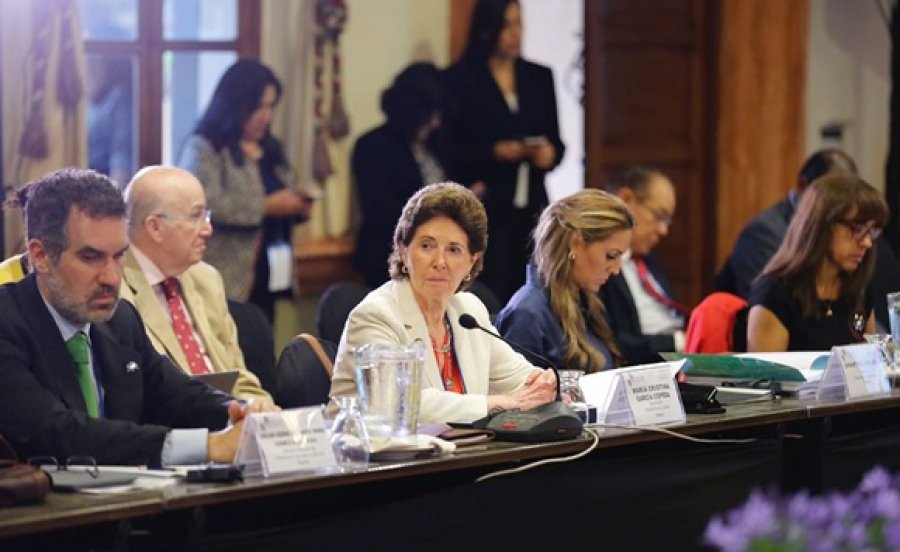Noticias
As part of the XIX Ibero-American Conference of Ministers of Culture
"In Mexico, we embrace Ibero-American programs as bridges of understanding between cultures": María Cristina García Cepeda
May 03, 2018La Antigua, Guatemala.- As part of the XIX Ibero-American Conference of Ministers of Culture held in this city, the Secretary of Culture of Mexico, María Cristina García Cepeda, stated that the Ibero-American countries, through their ministries of culture, their artistic and cultural communities, their tradition, their history and their vision of the future, have created a space of trust with the Ibero-American General Secretariat (SEGIB, for its acronym in Spanish) and the synergies that the International Cooperation for Development Agencies have established, in order to make culture a space for meeting and alliance.
She said that the development and implementation of the several joint mechanisms of intercultural cooperation are based on the democratization of access to culture and citizen participation, with the aim of contributing to the formation of a more critical, participatory and inclusive citizenship in the context of interculturality and diversity.
María Cristina García Cepeda stated that in Mexico we embrace Ibero-American programs as bridges of understanding between cultures, as solid complementary tools in the fulfillment of sustainable development objectives.
"In an increasingly complex and changing world, the nations of Ibero-America will continue to build a region of unity and solidarity, which finds in its common roots and cultural diversity a solid basis for cooperation towards regional development”.
She recalled that, since the adoption in 2007 of the Fribourg Declaration, which was born out of the urgency of considering cultural rights as an essential part of human rights, Mexico included in its Constitution two years later the right to access to culture, to the enjoyment of goods and services provided by the State in this field and to the exercise of cultural rights, as part of individual guarantees.
She said that in order to create the conditions that would make the exercise of this right possible, the State was obliged to provide the necessary means, under the premise of attending to cultural diversity and respecting creative freedom. For this reason, in 2011, individual guarantees were considered as human rights, so that access to culture in Mexico is now a human right protected by the Constitution and by the international treaties to which our country is a party.
The Secretary of Culture of the Government of the Republic explained that Mexico has forged, throughout its independent life, a solid tradition of cultural policy of support for the arts, training of talents, means and spaces to preserve heritage and disseminate cultural artistic manifestations. The formulation of these tasks under the figure of cultural rights included in the Constitution gives a new dimension to this historic task.
The XIX Ibero-American Summit of Ministers of Culture highlighted the presence of Paulo Speller, outgoing General Secretary of the Organization of Ibero-American States for Education, Science and Culture; Mariano Jabonero, elected General Secretary of the OEI; María Andrea Albán, General Secretary for Ibero-American Cooperation of Segib; Sandra Jovel Polanco, Minister of Foreign Affairs of Guatemala; and José Luis Chea Urruela, Minister of Culture and Sports of Guatemala. The Secretary of Culture of Mexico addressed the right to culture and to inclusive and intercultural citizen participation.
In this regard, said the Mexican Secretary of Culture, in recent decades, awareness of cultural diversity has led to the consolidation of many instruments, pronouncements and measures for the protection, promotion and defense of the right to culture.
She also stressed that today we know with greater certainty the close relationship that exists in our country between its natural and cultural resources. With just over 1% of the earth's surface, it has at least 10% of the planet's biodiversity.
"This makes it the fourth country in the world, which coincides with the fact that it is one of the five most culturally diverse. Mexico ranks seventh in the list of cultural and natural heritage, seventh in documentary heritage and eighth in intangible heritage, and fifth in linguistic diversity”.
María Cristina García Cepeda said that the Department of Culture reaffirms that the existence of a public policy to promote cultural creation and activities, and a cultural administration, based on a body in charge of its management at the national level, are fully compatible with the independence of cultural creators and producers and with the participation of the different public, social and private actors in the construction of this policy.
"Culture is a solid response that helps us to recover the social fabric, to strengthen our pride, to reaffirm our identity. We subscribe to what José Luis Chea Urruela, Minister of Culture and Sports of Guatemala, said and reaffirm that culture is the answer to the challenges of today's world, to the challenges of tomorrow”.
Mexico,Distrito Federal
